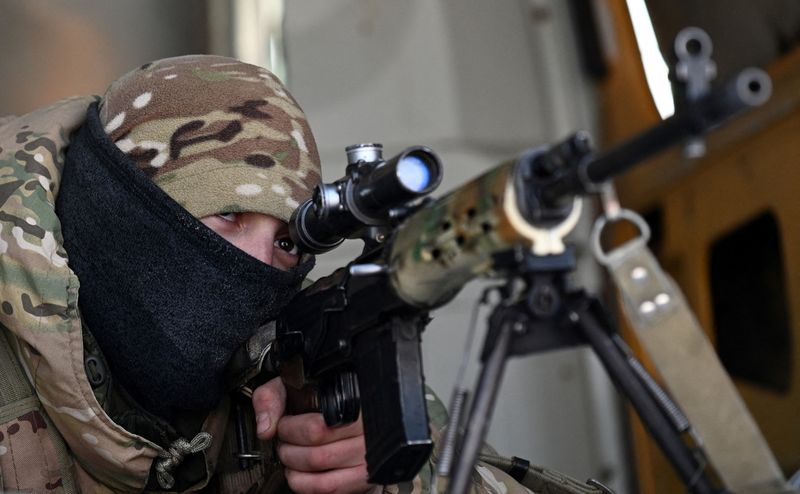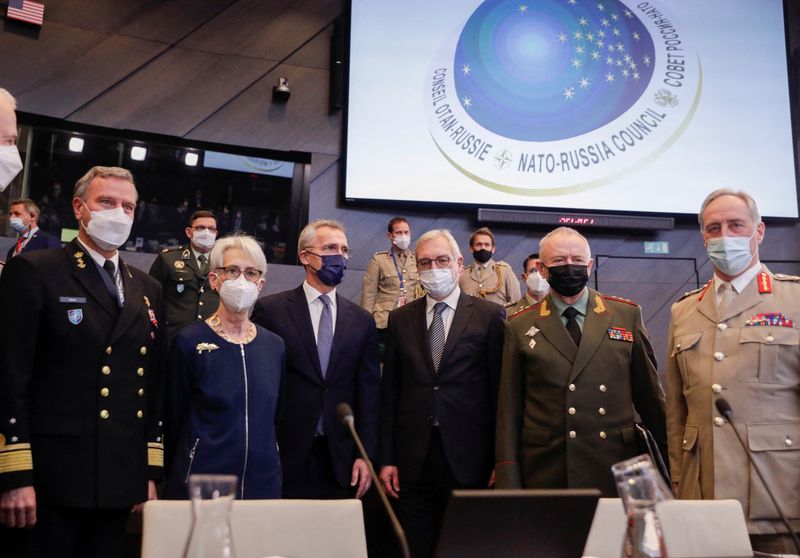By Thomas Escritt and Tom Balmforth
VIENNA/MOSCOW (Reuters) -Poland's foreign minister said on Thursday that Europe was at risk of plunging into war as Russia said it was not yet giving up on diplomacy but that military experts were preparing options in case tensions over Ukraine could not be defused.
In Washington, the White House said the threat of a Russian invasion of Ukraine remained high with some 100,000 Russian troops deployed and the United States would make public within 24 hours intelligence suggesting Russia might seek to invent a pretext to justify one.
"The drumbeat of war is sounding loud, and the rhetoric has gotten rather shrill," Michael Carpenter, U.S. Ambassador to the Organization for Security and Cooperation in Europe (OSCE), said after talks with Russia in Vienna.
"The threat of military invasion is high," White House national security adviser Jake Sullivan told reporters. "There are no dates set for any more talks. We have to consult with allies and partners first."
Russia said dialogue was continuing but was hitting a dead end as it tried to persuade the West to bar Ukraine from joining NATO and roll back decades of alliance expansion in Europe - demands that the United States has called "non-starters".
"At this stage it is really disappointing," Russian Ambassador Alexander Lukashevich told reporters after a meeting of the OSCE, the third leg in a series of East-West talks this week.
He warned of possible "catastrophic consequences" if the two sides could not agree on what Russia has termed security red lines but said Moscow had not given up on diplomacy and would even speed it up.
The Russian comments reflect a pattern of Moscow saying it wants to pursue diplomacy but rejecting calls to reverse its troop build-up near Ukraine and warning of unspecified consequences for Western security if its demands go unheeded.
Earlier, Polish Foreign Minister Zbigniew Rau told the 57-nation security forum: "It seems that the risk of war in the OSCE area is now greater than ever before in the last 30 years."
While overlooking wars during that period in the former Yugoslavia and parts of the former Soviet Union, his comment highlighted the level of European anxiety over Russia's build-up of some 100,000 troops within reach of its border with Ukraine.
Russia denies plans to invade Ukraine but its military build-up has forced the United States and its allies to the negotiating table.
Rau reported no breakthrough at the Vienna meeting, which followed Russia-U.S. talks in Geneva on Monday and a Russia-NATO conference in Brussels on Wednesday.
'DIFFERENCE OF APPROACHES'
Russian Deputy Foreign Minister Sergei Ryabkov said the earlier meetings had shown there was a "dead end or difference of approaches", and he saw no reason to sit down again in the coming days to re-start the same discussions.
He told RTVI television Russian military specialists were providing options to President Vladimir Putin in case the Ukraine situation worsened but diplomacy must be given a chance.
The Russian rouble fell by more than 2% against the dollar on Ryabkov's comments, which also prompted a sell-off in government bonds. A trader at a major Russian bank told Reuters the market had partly reacted to a comment from Ryabkov, in reply to a question, that he would neither confirm nor rule out the possibility that Russia might deploy "military infrastructure" in Cuba and Venezuela.
Sullivan said U.S intelligence agencies believed Russia may want "the option of fabricating a pretext for an invasion, including through sabotage activities and information operations, by accusing Ukraine of preparing an imminent attack against Russian forces in Eastern Ukraine."
Washington would share details "on what we see as this potential laying of a pretext" with the media within 24 hours, he added.
U.S. Defense Secretary Lloyd Austin spoke to his Ukrainian counterpart, Oleksii Reznikov, about the Russian buildup. The Pentagon estimated two-thirds of the Russian forces near Ukraine were "out-of-garrison," meaning they had deployed from other parts of Russia.
'ELIMINATE THREATS'
Moscow says it is threatened by NATO's expansion towards its borders by taking in 14 new members from former communist eastern Europe since the Cold War ended. It wants to draw "red lines" to stop the alliance from admitting Ukraine as a member or basing missiles there.
Washington has rejected those demands but said it is willing to talk about arms control, missile deployments and confidence-building measures to move on from one of the most fraught moments in East-West relations since the Cold War.
Ambassador Lukashevich told the OSCE that unless Moscow received a constructive response, "we will be forced to draw appropriate conclusions and take all necessary measures to ensure strategic balance and eliminate unacceptable threats to our national security."
He went on: "Russia is a peace-loving country. But we do not need peace at any cost. The need to obtain these legally formalised security guarantees for us is unconditional."
Kremlin spokesman Dmitry Peskov criticised a sanctions bill unveiled by U.S. Senate Democrats that would target top Russian government and military officials, including Putin, as well as banking institutions, if Russia attacks Ukraine.

Peskov said imposing sanctions on Putin would be tantamount to severing relations.
"We view the appearance of such documents and statements extremely negatively against the background of an ongoing series of negotiations, albeit unsuccessful ones," he said.
